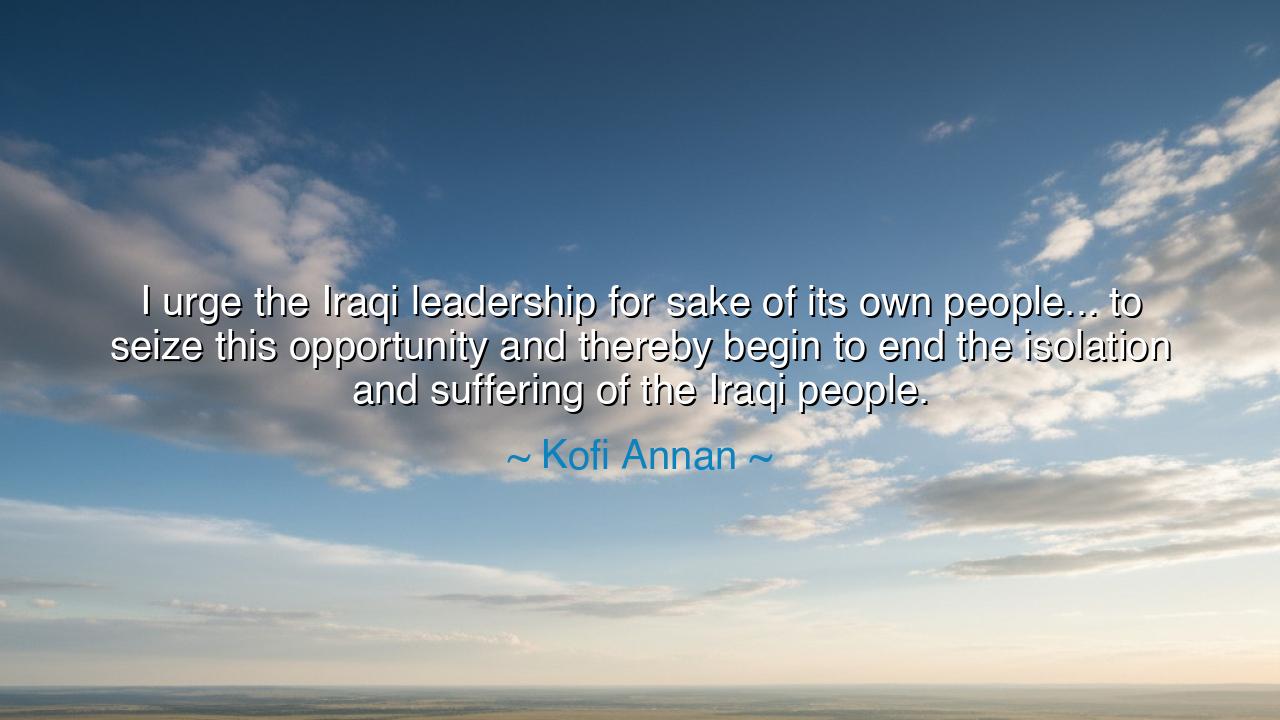
I urge the Iraqi leadership for sake of its own people... to
I urge the Iraqi leadership for sake of its own people... to seize this opportunity and thereby begin to end the isolation and suffering of the Iraqi people.






When Kofi Annan, the noble Secretary-General of the United Nations, spoke these words — “I urge the Iraqi leadership for sake of its own people... to seize this opportunity and thereby begin to end the isolation and suffering of the Iraqi people,” — he was not speaking only to a government, but to the conscience of humanity. His plea rose in a time of shadows, when war and pride had torn a nation apart, and the world watched in anguish. His voice was the voice of a peacemaker, carrying the weight of centuries of conflict and hope. Beneath his calm tone lay a cry as old as civilization itself: that rulers must remember the sacred bond between power and mercy, and that true leadership is measured not by domination, but by compassion for one’s people.
In these words, Kofi Annan sought not merely political change, but a moral awakening. He spoke in an age when Iraq was suffering under sanctions and isolation — its people caught between the might of external powers and the stubbornness of their own leaders. Annan, who had seen famine, war, and despair across continents, understood that the greatest tragedy of conflict is not in the halls of politics but in the streets of the ordinary — the mother without medicine, the child without hope, the worker without food. Thus his plea, “for the sake of its own people,” was both diplomatic and deeply human. He reminded the leaders of Iraq that sovereignty means nothing if it condemns one’s citizens to suffering and silence.
The origin of his words lies in the moral foundation of his life’s work — the belief that peace is not given; it must be chosen. As Secretary-General during the late 1990s and early 2000s, Annan stood between nations that sought justice and those that feared humiliation. The Iraq of that time was burdened by international sanctions, accused of defiance, and estranged from the world. Yet Annan’s tone was not one of accusation, but of reconciliation. His wisdom mirrored that of the ancient philosophers — who taught that the wise ruler governs not by fear, but by wisdom, not for glory, but for the well-being of the people.
History has seen many such moments when the powerful were called to mercy. In ancient China, Emperor Wen of Han, upon inheriting a nation scarred by harsh rule, abolished cruel punishments and reduced taxes. He said, “The empire is tired. Let the people rest.” And in that rest, prosperity bloomed. Kofi Annan’s words carry the same spirit — the eternal reminder that the strength of a nation lies in the peace of its citizens, not in the pride of its rulers. When leaders ignore this truth, history remembers not their victories, but their failures — for every throne built on suffering eventually crumbles beneath the weight of its own injustice.
There is also in his plea the deeper wisdom of the peacemaker: that opportunity, once lost, may never return. Annan urged the Iraqi leadership to “seize this opportunity,” because he understood that moments of reconciliation are fleeting, like openings in a storm. Nations, like souls, are given rare chances to turn away from ruin. To hesitate is to let the tide of history close that path forever. His call was not a command, but an invitation to redemption — to exchange isolation for dialogue, and despair for dignity.
In a world still divided by greed and suspicion, the lesson of his words burns bright: that leadership is not the pursuit of power, but the protection of life. Every person who holds influence — whether over nations, communities, or families — must remember this sacred truth. When pride tempts us to stand firm at the expense of peace, we must hear the voice of Annan whisper: “For the sake of your own people.” Power that isolates is weakness; power that heals is divine.
And so, let his wisdom live beyond its time. Let rulers and citizens alike learn that peace is born from humility, that true strength lies in compassion, and that every opportunity for understanding is a doorway to salvation. Kofi Annan’s plea was not bound to Iraq alone — it is a message to every heart that leads, every soul that governs: seize the moment to end suffering, for no victory is worth the tears of one’s people. In that truth lies the eternal law of leadership — that to serve others is the highest form of power, and to bring peace is the noblest act of all.






AAdministratorAdministrator
Welcome, honored guests. Please leave a comment, we will respond soon